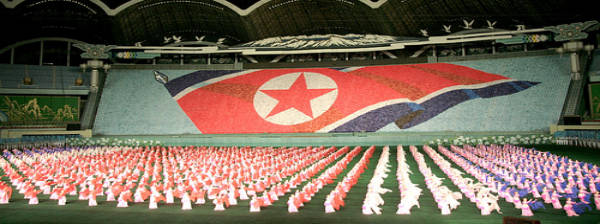
An estimated one million North Koreans died of starvation in the late 1990s. Since then, the country has managed to feed itself only by accepting large quantities of foreign food aid. But now, in the midst of what the United Nations says is its worst food shortage in more than a decade, the so-called “Hermit Kingdom” of Kim Jong Il has designed a staple that it hopes can ward off mass hunger, something not unlike the Elven bread that sustained Frodo and Sam during their trek into Mordor. According to Choson Shinbo, a Japan-based newspaper sympathetic to Pyongyang, North Korean scientists have developed a wonder noodle, made of corn and soybeans, that delays hunger pangs. It packs twice the protein and five times the fat of the average noodle, says the newspaper. “When you consume ordinary noodles (made from wheat and corn), you may soon feel your stomach empty. But this soybean noodle delays such a feeling of hunger.”
The innovative noodle couldn’t have come at a better time, given North Korea’s recent decision to halt the dismantling of its nuclear program, a move that surely will not ingratiate the regime to foreign donors of food aid. North Korea announced today that it stopped the demolition of its Yongbyon plutonium reactor on August 14. The regime had committed to taking it offline as part of an agreement brokered during six-party (North Korea, United States, South Korea, China, Japan, and Russia) talks aimed at ending North Korea’s nuclear program. In exchange, the Bush administration promised to provide energy aid in the form of fuel oil, lift economic sanctions, and remove North Korea from its list of nations that sponsor terrorism.
The latter is at the center of the latest spat. In June, North Korea submitted to China a 60-page, English-language accounting of its nuclear activities at Yongbyon dating back to 1986, including details of the process that ultimately yielded enough fissile material for seven nuclear bombs. But the agreement stipulated that, before North Korea would receive any relief, it had to also submit to inspections of facilities and interviews of its nuclear scientists. The United States insists that these inspections be unannounced, along the lines how nuclear inspectors did their work in Iraq prior to the invasion. To this, North Korea now says no way. “The U.S. is gravely mistaken if it thinks it can make a house search in the DPRK as it pleases just as it did in Iraq,” a regime spokesman said today, adding that the US demand is “an outright violation of the agreement.”
Both sides say that talks will continue.
Photo used under a Creative Commons license from Ryuugakusei.









